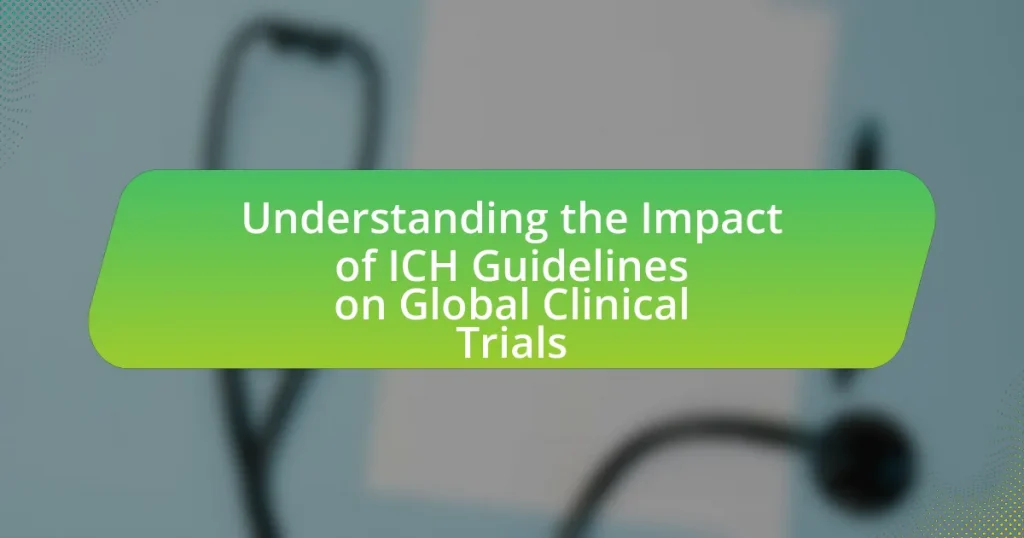ICH Guidelines, established by the International Council for Harmonisation, are critical international standards that ensure the quality, safety, and efficacy of pharmaceuticals across different regions. This article explores the influence of ICH Guidelines on clinical trial design, emphasizing their role in standardizing protocols, enhancing patient safety, and ensuring data integrity. Key components of these guidelines, including Good Clinical Practice and various efficacy and safety guidelines, are discussed in relation to their impact on global clinical trials and regulatory harmonization. Additionally, the article addresses challenges in implementing these guidelines and highlights future trends, innovations, and practical steps for researchers to align with ICH standards.

What are ICH Guidelines and their Purpose?
ICH Guidelines are a set of international standards developed by the International Council for Harmonisation of Technical Requirements for Pharmaceuticals for Human Use. Their purpose is to ensure that the quality, safety, and efficacy of pharmaceuticals are consistent across different regions, facilitating the mutual acceptance of clinical trial data by regulatory authorities. These guidelines promote harmonization in the development and registration of new drugs, thereby streamlining the process and reducing duplication of efforts in clinical trials.
How do ICH Guidelines influence clinical trial design?
ICH Guidelines significantly influence clinical trial design by establishing standardized protocols that enhance the quality, safety, and efficacy of clinical research. These guidelines provide a framework for the design, conduct, and reporting of clinical trials, ensuring that they meet international regulatory requirements. For instance, the ICH E6 guideline on Good Clinical Practice (GCP) outlines essential principles that protect trial subjects and ensure data integrity, which is critical for regulatory submissions. By harmonizing regulatory requirements across different regions, ICH Guidelines facilitate multinational trials, reduce duplication of efforts, and streamline the approval process, ultimately leading to more efficient drug development.
What are the key principles outlined in ICH Guidelines?
The key principles outlined in ICH Guidelines include quality, safety, efficacy, and multidisciplinary collaboration. These principles aim to ensure that pharmaceutical development and registration processes are harmonized across different regions, facilitating global clinical trials. The ICH Guidelines promote the integration of scientific and technical aspects, ensuring that data generated from clinical trials is reliable and can be accepted by regulatory authorities worldwide. This harmonization is supported by the fact that ICH Guidelines are developed through collaboration among regulatory authorities and the pharmaceutical industry, enhancing the efficiency of drug development and approval processes.
How do these principles ensure patient safety and data integrity?
The principles outlined in the ICH Guidelines ensure patient safety and data integrity by establishing rigorous standards for clinical trial conduct. These guidelines mandate ethical considerations, such as informed consent and the protection of vulnerable populations, which directly enhance patient safety. Additionally, they require comprehensive data management practices, including accurate record-keeping and validation processes, which uphold data integrity. For instance, adherence to Good Clinical Practice (GCP) ensures that trials are conducted in a manner that prioritizes participant welfare and maintains the reliability of trial results, as evidenced by the consistent application of these standards across international regulatory frameworks.
Why are ICH Guidelines important for global clinical trials?
ICH Guidelines are important for global clinical trials because they establish a unified framework for the design, conduct, and reporting of clinical research across different countries. This harmonization facilitates regulatory approval processes, reduces duplication of studies, and enhances the quality and safety of clinical trials. For instance, the ICH E6 guideline on Good Clinical Practice (GCP) provides standards that ensure the integrity of data and the protection of trial participants, which is critical for gaining trust from regulatory authorities and stakeholders worldwide.
What role do ICH Guidelines play in harmonizing regulatory requirements?
ICH Guidelines play a crucial role in harmonizing regulatory requirements across different countries by providing a unified framework for the development and registration of pharmaceuticals. These guidelines facilitate international collaboration and reduce discrepancies in regulatory processes, which can lead to faster approval times and increased access to medicines. For instance, the ICH guidelines on Good Clinical Practice (GCP) standardize the ethical and scientific quality of clinical trials, ensuring that data generated is reliable and can be accepted by regulatory authorities in multiple jurisdictions. This harmonization is evidenced by the adoption of ICH guidelines by major regulatory bodies, including the FDA in the United States and the EMA in Europe, which has resulted in a more streamlined and efficient regulatory landscape for global clinical trials.
How do ICH Guidelines facilitate international collaboration in clinical research?
ICH Guidelines facilitate international collaboration in clinical research by providing a standardized framework for regulatory requirements, ensuring consistency in data quality and safety across different countries. These guidelines, established by the International Council for Harmonisation, promote the sharing of research findings and methodologies, which enhances cooperation among regulatory authorities, sponsors, and researchers globally. For instance, the adoption of Good Clinical Practice (GCP) standards under ICH ensures that clinical trials are conducted ethically and scientifically, which is crucial for gaining regulatory approval in multiple jurisdictions. This harmonization reduces duplication of efforts and accelerates the development of new therapies, ultimately benefiting patients worldwide.

What are the Key Components of ICH Guidelines?
The key components of ICH guidelines include Good Clinical Practice (GCP), Quality Guidelines (Q), Safety Guidelines (S), Efficacy Guidelines (E), and Multidisciplinary Guidelines (M). These components establish a framework for the design, conduct, and reporting of clinical trials, ensuring that they are ethical, scientifically sound, and compliant with regulatory requirements. For instance, GCP emphasizes the protection of human subjects and the integrity of data, while Quality Guidelines focus on ensuring that pharmaceutical products meet quality standards throughout their lifecycle. The ICH guidelines are essential for harmonizing regulatory requirements across different regions, thereby facilitating global clinical trials and enhancing the efficiency of drug development processes.
What are the different ICH guidelines relevant to clinical trials?
The different ICH guidelines relevant to clinical trials include ICH E6 (Good Clinical Practice), ICH E8 (General Considerations for Clinical Trials), ICH E9 (Statistical Principles for Clinical Trials), ICH E10 (Choice of Control Group and Related Issues in Clinical Trials), and ICH E17 (Multi-Regional Clinical Trials). These guidelines provide a framework for the design, conduct, and reporting of clinical trials, ensuring that they are scientifically sound and ethically conducted. For instance, ICH E6 outlines the principles of Good Clinical Practice, which is essential for ensuring the integrity of clinical trial data and the protection of trial subjects.
How does each guideline address specific aspects of clinical research?
Each guideline addresses specific aspects of clinical research by providing structured frameworks that ensure safety, efficacy, and ethical standards. For instance, the ICH E6 guideline focuses on Good Clinical Practice (GCP), emphasizing the importance of informed consent and the protection of trial subjects, which is crucial for ethical compliance. The ICH E8 guideline outlines the principles of clinical trial design, ensuring that studies are scientifically sound and capable of producing reliable data. Additionally, the ICH E9 guideline addresses statistical considerations, providing guidance on the design and analysis of clinical trials to ensure that results are valid and interpretable. These guidelines collectively enhance the quality and integrity of clinical research, facilitating regulatory approval and promoting public trust in clinical trials.
What are the implications of non-compliance with these guidelines?
Non-compliance with ICH guidelines can lead to significant legal, financial, and ethical implications for clinical trials. Specifically, organizations may face regulatory penalties, including fines and the potential for disqualification of trial data, which can hinder the approval process for new drugs. For instance, the FDA has the authority to reject submissions based on non-compliance, as seen in cases where data integrity was compromised. Additionally, non-compliance can damage a company’s reputation, resulting in loss of trust among stakeholders and participants, which is critical for future trials. Furthermore, ethical breaches may lead to harm to participants, raising serious moral concerns and potentially resulting in lawsuits.
How do ICH Guidelines impact the conduct of clinical trials?
ICH Guidelines significantly impact the conduct of clinical trials by establishing standardized protocols that enhance the quality, safety, and efficacy of pharmaceutical development. These guidelines, developed by the International Council for Harmonisation, promote consistency across different regulatory environments, facilitating smoother approval processes and reducing duplication of efforts in clinical research. For instance, adherence to Good Clinical Practice (GCP) as outlined in ICH E6 ensures that trials are conducted ethically and that data integrity is maintained, which is crucial for regulatory submissions. Furthermore, the harmonization of data requirements across regions, as seen in ICH E3, streamlines the documentation process, allowing for more efficient communication between sponsors and regulatory authorities. This ultimately leads to faster patient access to new therapies and improved global health outcomes.
What are the effects of ICH Guidelines on trial protocols?
The ICH Guidelines significantly standardize trial protocols across global clinical research. These guidelines promote consistency in the design, conduct, and reporting of clinical trials, which enhances the reliability of data collected. For instance, adherence to ICH E6 (Good Clinical Practice) ensures that trials are conducted ethically and that participant safety is prioritized, leading to improved regulatory compliance. Furthermore, the harmonization of protocols reduces duplication of efforts and facilitates multinational trials, ultimately accelerating the drug development process. This impact is evidenced by the increased efficiency in regulatory submissions and approvals, as seen in the rise of successful multi-regional clinical trials since the implementation of these guidelines.
How do ICH Guidelines influence data management and reporting?
ICH Guidelines significantly influence data management and reporting by establishing standardized practices that enhance the quality and integrity of clinical trial data. These guidelines, developed by the International Council for Harmonisation, provide a framework for data collection, analysis, and reporting, ensuring consistency across different regions and regulatory environments. For instance, ICH E6(R2) emphasizes the importance of Good Clinical Practice (GCP), which mandates that data must be accurate, complete, and verifiable against source documents. This requirement helps to minimize errors and discrepancies in data management, ultimately leading to more reliable reporting outcomes. Additionally, adherence to ICH guidelines facilitates regulatory submissions, as they align with the expectations of major health authorities, thereby streamlining the approval process for new therapies.

What Challenges are Associated with Implementing ICH Guidelines?
Implementing ICH guidelines presents several challenges, including variability in regulatory interpretations across different countries, which can lead to inconsistencies in clinical trial processes. Additionally, the complexity of the guidelines may overwhelm smaller organizations lacking the necessary resources or expertise to comply effectively. A study published in the Journal of Clinical Research & Bioethics highlights that these challenges can result in delays in trial initiation and increased costs, ultimately affecting the speed at which new therapies reach the market.
What are the common obstacles faced by researchers in adhering to ICH Guidelines?
Researchers commonly face obstacles such as lack of resources, insufficient training, and regulatory complexities when adhering to ICH Guidelines. Limited funding often restricts access to necessary tools and personnel, hindering compliance efforts. Additionally, many researchers may not receive adequate training on the guidelines, leading to misunderstandings or misapplications. Regulatory complexities arise from varying interpretations of the guidelines across different regions, which can create confusion and inconsistencies in implementation. These factors collectively impede the effective adherence to ICH Guidelines in clinical trials.
How can organizations overcome these challenges?
Organizations can overcome challenges related to ICH guidelines in global clinical trials by implementing comprehensive training programs for staff and stakeholders. These training initiatives ensure that all personnel are well-versed in the latest ICH standards, which enhances compliance and reduces errors. For instance, a study by the Clinical Trials Transformation Initiative found that organizations with robust training protocols experienced a 30% decrease in protocol deviations, demonstrating the effectiveness of education in navigating regulatory complexities. Additionally, fostering collaboration with regulatory bodies can provide organizations with insights and support, further facilitating adherence to ICH guidelines.
What resources are available to assist with compliance?
Resources available to assist with compliance include regulatory agencies, industry guidelines, and training programs. Regulatory agencies such as the FDA and EMA provide comprehensive guidelines and frameworks that outline compliance requirements for clinical trials. Additionally, the International Council for Harmonisation (ICH) offers specific guidelines that help ensure compliance with international standards. Training programs and workshops conducted by organizations like the Association of Clinical Research Organizations (ACRO) and the Clinical Trials Transformation Initiative (CTTI) equip professionals with the necessary knowledge and skills to adhere to compliance standards. These resources collectively support organizations in navigating the complexities of compliance in clinical trials.
How can stakeholders ensure effective implementation of ICH Guidelines?
Stakeholders can ensure effective implementation of ICH Guidelines by actively engaging in training and education programs that promote understanding of the guidelines. This engagement is crucial as it equips stakeholders, including regulatory authorities, sponsors, and clinical research organizations, with the necessary knowledge to apply the guidelines correctly. For instance, the ICH has established training resources and workshops that facilitate comprehension of the guidelines, which have been shown to improve compliance rates in clinical trials. Furthermore, stakeholders should foster collaboration among industry partners to share best practices and experiences related to the guidelines, thereby enhancing collective adherence and implementation.
What best practices should be followed for compliance?
Best practices for compliance with ICH guidelines in global clinical trials include establishing a robust quality management system, ensuring thorough training for all personnel involved, and maintaining clear documentation of all processes. A quality management system helps organizations systematically manage compliance risks and ensure adherence to regulatory requirements. Training personnel on ICH guidelines ensures that all team members understand their roles and responsibilities, which is critical for maintaining compliance. Additionally, comprehensive documentation provides a clear audit trail, demonstrating compliance with regulatory standards and facilitating inspections by regulatory authorities. These practices collectively enhance the integrity and reliability of clinical trial data, which is essential for regulatory approval and patient safety.
How can training and education improve adherence to ICH Guidelines?
Training and education can significantly improve adherence to ICH Guidelines by equipping clinical trial personnel with the necessary knowledge and skills to understand and implement these standards effectively. When individuals involved in clinical trials receive comprehensive training on ICH Guidelines, they become more aware of the regulatory requirements and ethical considerations that govern their work. This understanding leads to better compliance with protocols, as evidenced by studies showing that organizations with structured training programs report higher adherence rates to regulatory standards. For instance, a survey conducted by the Clinical Trials Transformation Initiative found that 75% of respondents believed that targeted training improved compliance with ICH Guidelines. Therefore, systematic training and education are essential for fostering a culture of compliance and ensuring the integrity of clinical trials.
What are the Future Trends in ICH Guidelines and Global Clinical Trials?
Future trends in ICH guidelines and global clinical trials include increased emphasis on data integrity, patient-centric approaches, and the integration of digital technologies. The ICH is moving towards harmonizing regulatory requirements to facilitate faster drug development and approval processes across different regions. For instance, the adoption of electronic submissions and real-world evidence is becoming more prevalent, as seen in the FDA’s Real-World Evidence Framework, which aims to incorporate data from outside traditional clinical trials into regulatory decision-making. Additionally, there is a growing focus on diversity in clinical trial populations to ensure that findings are applicable to a broader range of patients, as highlighted in the FDA’s guidance on enhancing the diversity of clinical trial participants. These trends reflect a shift towards more efficient, inclusive, and technology-driven clinical research practices.
How are ICH Guidelines evolving to meet new challenges in clinical research?
ICH Guidelines are evolving to meet new challenges in clinical research by incorporating adaptive trial designs, enhancing data integrity, and addressing the complexities of global health crises. These adaptations reflect the need for more flexible methodologies that can respond to emerging scientific knowledge and regulatory requirements. For instance, the ICH E8(R1) guideline emphasizes the importance of quality by design and risk-based approaches, which facilitate more efficient trial processes and improve patient safety. Additionally, the ICH has introduced guidelines that focus on the use of real-world evidence and digital health technologies, acknowledging the growing role of data analytics in clinical decision-making. These changes are supported by ongoing collaborations with regulatory authorities and stakeholders to ensure that the guidelines remain relevant and effective in a rapidly evolving research landscape.
What innovations are being integrated into ICH Guidelines for better outcomes?
Innovations being integrated into ICH Guidelines for better outcomes include the adoption of digital health technologies, enhanced data sharing practices, and a focus on patient-centric approaches. Digital health technologies, such as mobile health applications and telemedicine, are being incorporated to improve patient engagement and data collection. Enhanced data sharing practices aim to streamline the regulatory process and facilitate collaboration among stakeholders, thereby accelerating drug development timelines. Additionally, the emphasis on patient-centric approaches ensures that clinical trials are designed with the patient’s needs and experiences in mind, ultimately leading to more relevant and effective treatments. These innovations are supported by ongoing discussions and revisions within the ICH framework, reflecting the evolving landscape of clinical research and regulatory science.
What Practical Steps Can Researchers Take to Align with ICH Guidelines?
Researchers can align with ICH guidelines by implementing a structured approach to clinical trial design and execution. This includes conducting thorough training on ICH principles for all team members, ensuring compliance with Good Clinical Practice (GCP), and utilizing standardized protocols for data collection and reporting. Additionally, researchers should engage in regular audits and quality checks to verify adherence to ICH standards. Evidence of the effectiveness of these steps can be seen in studies showing that adherence to ICH guidelines improves trial integrity and regulatory acceptance, ultimately leading to more reliable clinical outcomes.
How can researchers develop a compliance strategy for ICH Guidelines?
Researchers can develop a compliance strategy for ICH Guidelines by systematically aligning their clinical trial processes with the principles outlined in the guidelines. This involves conducting a thorough gap analysis to identify discrepancies between current practices and ICH requirements, followed by the implementation of standard operating procedures (SOPs) that reflect ICH standards. Additionally, training staff on ICH Guidelines and establishing a robust quality management system ensures ongoing compliance. Evidence of the effectiveness of such strategies can be seen in studies showing that adherence to ICH Guidelines improves data integrity and regulatory approval rates, thereby enhancing the overall quality of clinical trials.
What tools and resources can assist in maintaining adherence to ICH Guidelines?
Regulatory compliance software and training resources are essential tools for maintaining adherence to ICH Guidelines. Regulatory compliance software, such as Veeva Vault and MasterControl, helps organizations manage documentation, track changes, and ensure that all processes align with ICH standards. Training resources, including online courses and workshops provided by organizations like the Drug Information Association (DIA) and the Clinical Research Society, equip professionals with the knowledge necessary to understand and implement ICH Guidelines effectively. These tools and resources facilitate consistent adherence to the guidelines, thereby enhancing the quality and integrity of clinical trials.






